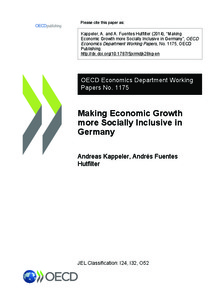Making economic growth more socially inclusive in Germany
"While past labour market reforms have been successful in terms of employment, the relative poverty risk and income inequality have remained broadly unchanged in recent years. Some social groups remain particularly vulnerable, including individuals in non-regular employment, the unemployed and...
| Main Authors: | , |
|---|---|
| Institution: | ETUI-European Trade Union Institute |
| Format: | TEXT |
| Language: | English |
| Published: |
Paris
2014
OECD |
| Subjects: | |
| Online Access: | https://www.labourline.org/KENTIKA-19115430124919336129-Making-economic-growth-more-so.htm |
| Summary: | "While past labour market reforms have been successful in terms of employment, the relative poverty risk and income inequality have remained broadly unchanged in recent years. Some social groups remain particularly vulnerable, including individuals in non-regular employment, the unemployed and the low skilled. If in employment, their jobs tend to be unstable and wages and income mobility low. Continued efforts are needed to foster economic growth in a more inclusive manner, such that the most vulnerable groups benefit from and contribute to economic growth more strongly and such that the gaps between the rich and the poor in terms of income and wellbeing are reduced. These efforts should include enhancing the labour market outcomes of the most vulnerable and increase upward income mobility among disadvantaged individuals; strengthening skills at the lower end of the skills distribution; revising the tax and benefit system to improve incentives and to ensure efficient and well-targeted redistribution; and to make health and old-age pension insurance more inclusive. This working paper relates to the 2014 OECD Economic Survey of Germany." |
|---|---|
| Physical Description: | 37 p. Digital |

